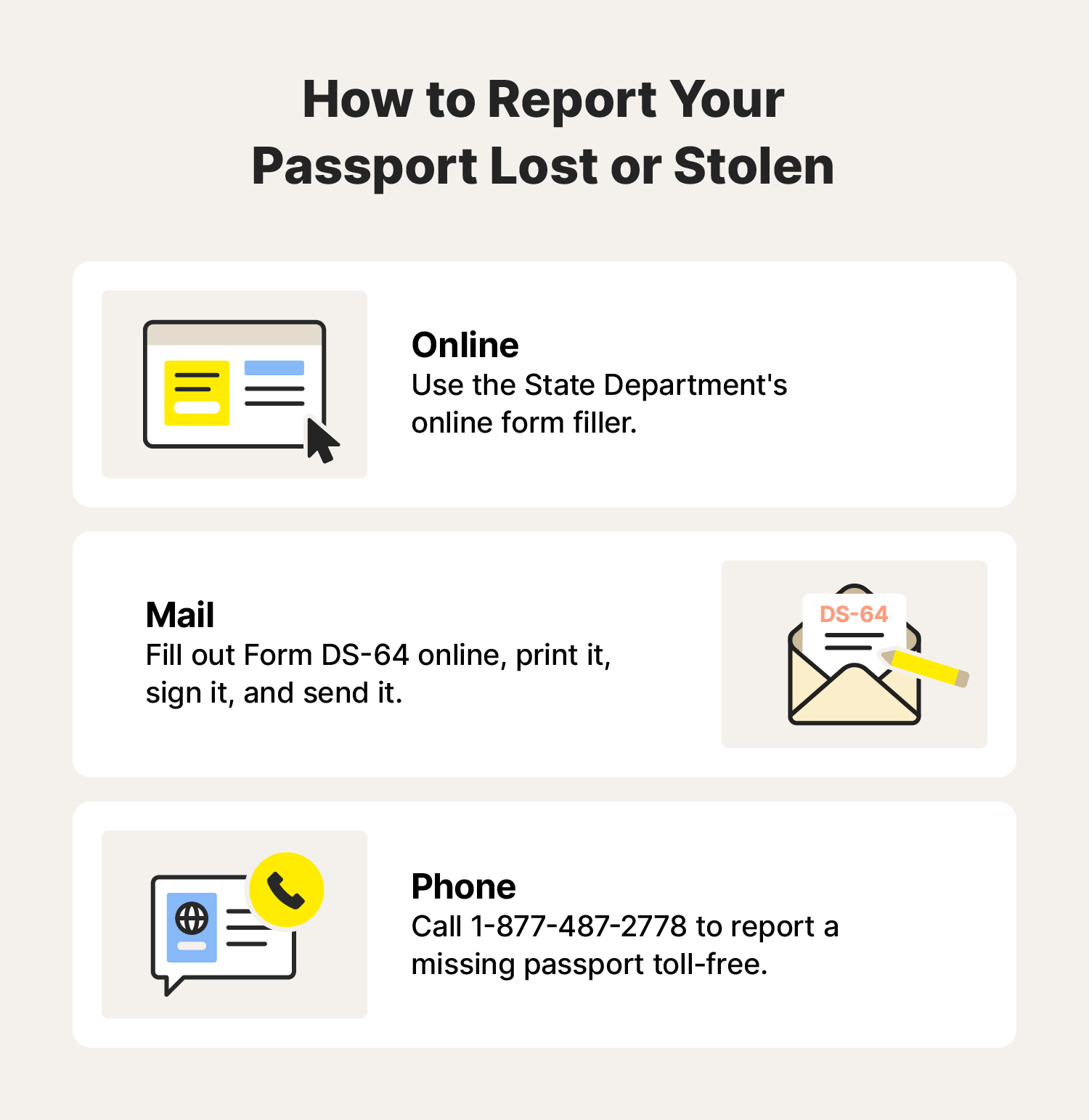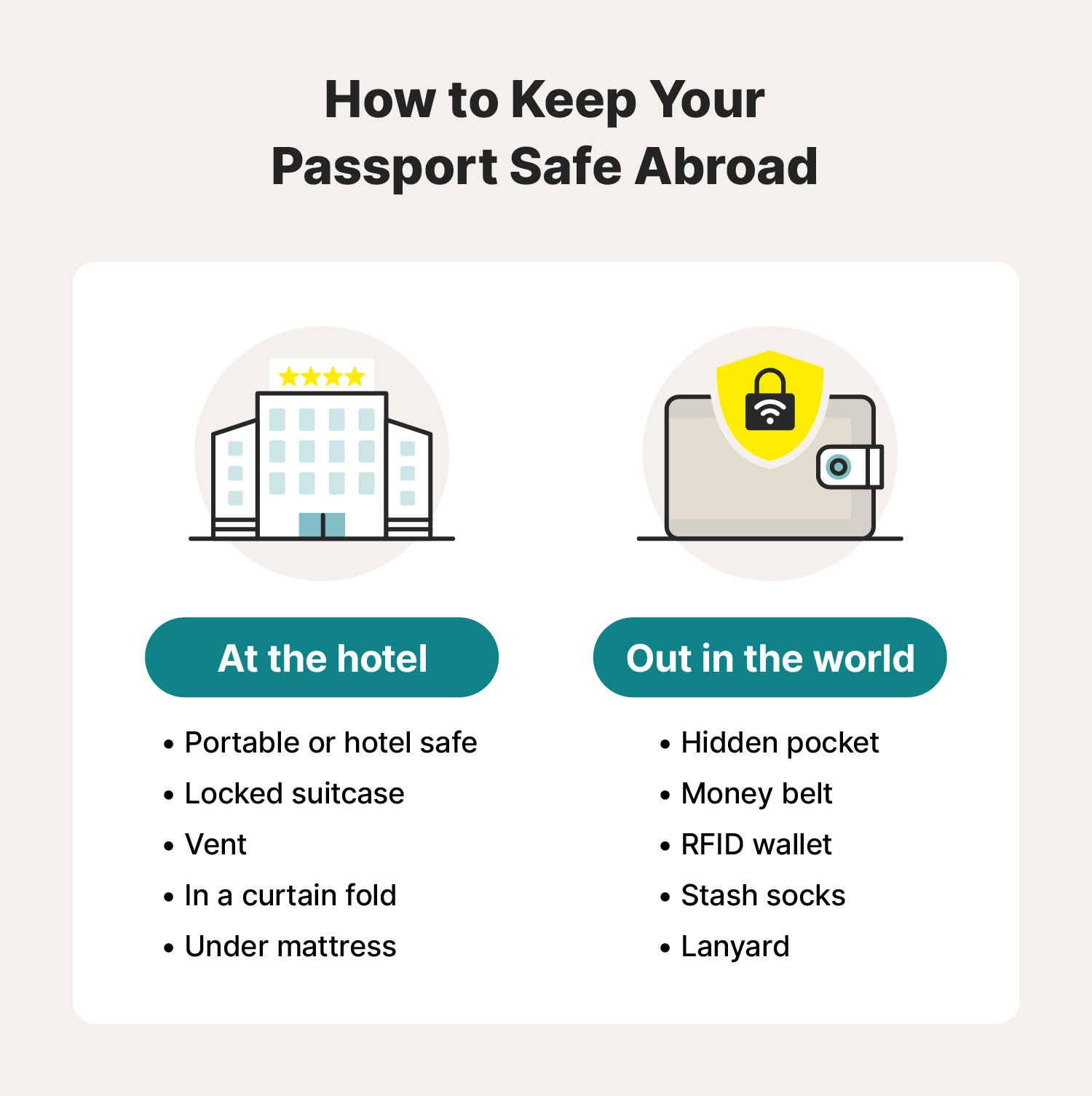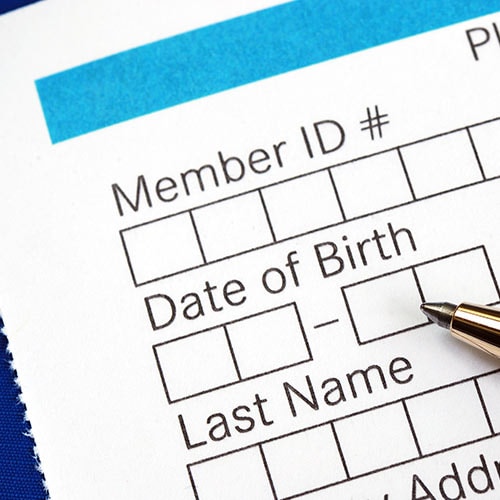A lost or stolen passport can lead to many problems whether you’re home or abroad. Passport thieves could use your ID to open accounts in your name, apply for jobs or benefits, or possibly travel internationally—and that’s just the start. Learn what to do when you lose your passport and how to get a replacement passport faster.
What happens if you lose your passport in another country?
If you lose your passport abroad, report it to the nearest U.S. consulate or embassy. Then, begin the replacement application process where you are, not traveling until your new passport is issued. You won't be allowed back into the U.S. without a valid passport.
Depending on where you are, you may have to wait up to eight weeks to receive a replacement passport. If you need an urgent replacement, you may be able to get a limited-validity emergency passport quickly, sometimes on the same day.
Steps to take if you lose your passport
If your passport is lost or stolen, try to relax, remember that these things happen, and that you can get the help you need. Here are the most important steps to take if you lose your passport or think it’s stolen.
1. Report your passport lost or stolen
If you’re outside the U.S., you should report a lost or stolen passport to the U.S. Department of State as well as to the local police department who can help you if your passport is found.
If you’re in the U.S., you can report a lost or stolen passport online, by mail, or over the phone. The government will then cancel your passport so it can no longer be used (even by you if you were to find it).
Reporting a lost or stolen passport is crucial; not only does it help protect against possible identity theft, but you’ll also likely need the loss or theft documented when you apply for a replacement.
Here’s how to report a missing passport:
- Online: Use the State Department’s online form filler—click Submit in the Report Lost or Stolen column to launch the form.
- Mail: Fill out Form DS-64 online, print and sign it, and send it (and the photo ID requested on the form) to the address listed there.
- Phone: Call 1-877-487-2778 (TTY 1-888-874-7793) to report a missing passport toll-free.
Note that simply reporting your passport lost or stolen doesn’t automatically get you a replacement. To do that, you’ll need to begin an application process in person.

2. Apply for a replacement passport
To replace a passport lost in the U.S., you have to apply in person at a passport acceptance facility. If you’re abroad, contact the nearest U.S. consulate or embassy for a replacement.
Here’s a breakdown of what to do when applying for a replacement passport:
| If this describes you… | Then this is what you should do… |
| You are in the U.S. and traveling within the next few weeks. | Make an appointment or apply in person to replace your passport at the nearest passport agency or center. |
| You are in the U.S. and are traveling two months from now or later. | Make an appointment or apply in person at a passport acceptance facility to replace your passport. |
| You are outside the U.S. | Contact or visit the nearest U.S. consulate or embassy to replace your passport. |
If you notice your passport is missing while you’re still in the States, you can get a replacement by applying at a local passport acceptance facility. Remember to bring the following documents with you:
- Passport photo
- Photo ID
- Proof of citizenship
- Form DS-11 (Application for Passport)
- Form DS-64 (Statement Regarding a Lost or Stolen Passport)
Tip: If you have urgent travel plans in the next 14 days, make an appointment at a passport agency instead of an acceptance facility to expedite the replacement process.
If you lose your passport while traveling outside of the U.S., go to the nearest U.S. consulate or embassy and ask for the Consular Section. They will help you get a replacement passport so you can return to the U.S. as quickly as possible.
Get a passport replacement abroad
Replacing your passport abroad may take weeks or even months, but you can streamline the process by bringing as many of the necessary documents with you as possible.
If you need to travel urgently, you can ask for an emergency passport, which has a limited validity period and can be issued on the same day.
To replace your passport overseas, take the following to the embassy or consulate:
- Passport photo
- Identification (expired passport, driver’s license, etc.)
- Evidence of U.S. citizenship (photocopy of your missing passport, birth certificate)
- Travel itinerary
- Form DS-11 (Application for Passport)
- Form DS-64 (Statement Regarding a Lost or Stolen Passport)
- Police report (this isn’t mandatory but can help confirm the loss or theft; if you’re worried about delaying your travel, skip the report)
If you can’t present all the documents, consular staff will do their best to help you get a new passport quickly.
After completing the application, make copies and keep receipts of any paperwork you submit to the local authorities, embassy, or consulate. These documents often have unique reference numbers that you can use to keep track of your passport status.
Tip: If you need to travel immediately, ask about getting a limited-validity emergency passport. While you can travel on this type of passport only for a limited time, you can exchange it for a full-validity passport later.
3. Make sure you have costs covered
Regardless of whether your passport was lost or stolen, regular passport fees apply. It’ll usually cost around $130 dollars to replace your passport, even if the original wouldn’t have expired for years.
Thankfully, if you’re on the Global Entry list, you won’t have to reapply and pay for the program again. You just need to log into the system and update the passport number synced to your account.
Tip: If you’re abroad and are having trouble securing the funds needed to cover the costs of replacing your passport, the State Department offers emergency financial assistance for U.S. citizens abroad.
4. Stay where you are until your new passport arrives
If you’re abroad and have a lost or stolen passport, you need to stay put until you have a replacement in hand, because you can’t travel internationally without a passport (or a passport card if you’re traveling between the U.S., Canada, and Mexico).
If you need to travel urgently, ask your nearest consulate, embassy, or passport agency for a limited-validity emergency passport. If you’re in the U.S., apply as soon as possible and at least three months before your next trip.
5. Check your travel plans and protection benefits
After reporting your passport missing and applying for a replacement, you should contact your credit card and insurance companies to see what assistance and services they offer.
Some credit card companies offer concierge services that can help you change flights, hotel reservations, and other travel arrangements. And insurance companies, especially if you have travel insurance, may be able to help cover the costs of rescheduling flights and hotel bookings.
Tips to help keep your passport safe while traveling
The best way to keep your passport from being lost or stolen is to keep it in a secure place or locked away, but that’s not always possible while traveling.
That said, there are some tips and tricks you can use to help keep your passport more secure while you’re traveling:
- Store your passport in a safe—this can be a TSA-approved portable safe, or an in-room or front desk hotel safe. You can also keep it in a locked suitcase.
- Hide your passport somewhere in your hotel room.
- Avoid bringing your passport with you while sightseeing.
- If you need to carry your passport, put it in a hidden pocket, a money belt, stash socks, or a lanyard.
- Carry it in a radio frequency identification (RFID) wallet to shield your passport from electronic pickpocketing and unauthorized scanning.
- Don’t take out your passport in front of strangers.

Unfortunately, thieves can be sly and slip past your safeguards. So you should also make copies of your passport and hide them in separate locations. This can help speed up the passport replacement process if the worst ever happens.
Safeguard your identity with LifeLock
Besides the inconvenience, a lost passport can leave you exposed to identity fraud and financial and reputational damage. And the longer you’re unaware of unauthorized usage of your identity, the more criminals may be able to exploit your personal information. That’s where a powerful identity theft protection service like LifeLock comes in.
LifeLock Total monitors common people-search sites as well as the dark web, notifying you if your personal information is found. And if your identity is stolen, LifeLock will provide you with the help you need to recover, including financial assistance to help reimburse you for stolen funds and personal expenses as well as help to block scammers and thieves from opening fraudulent accounts in your name.
FAQs about lost passports
Still have questions about what to do if you lose your passport? We have answers below.
What should you do if your passport gets lost in the mail?
If your passport gets lost in the mail, report it to the U.S. Department of State and the postal service responsible for handling your passport delivery. You’ll then need to apply for a passport again.
Do you still need to report a passport lost or stolen after it expires?
No, you don’t need to report an expired lost or stolen passport because it’s no longer a valid form of ID.
What should I do if I find someone else’s passport?
If you find a foreign passport in the U.S., return it to the embassy or consulate of the issuing country.
If you find a U.S. passport in the U.S., mail it to:
U.S. Department of State
Consular Lost and Stolen Passport Unit (CLASP)
44132 Mercure Circle
PO Box 1227
Sterling, VA 20166-1227
Editor’s note: Our articles provide educational information. LifeLock offerings may not cover or protect against every type of crime, fraud, or threat we write about.
Start your protection,
enroll in minutes.
LifeLock is part of Gen – a global company with a family of trusted brands.
Copyright © 2026 Gen Digital Inc. All rights reserved. Gen trademarks or registered trademarks are property of Gen Digital Inc. or its affiliates. Firefox is a trademark of Mozilla Foundation. Android, Google Chrome, Google Play and the Google Play logo are trademarks of Google, LLC. Mac, iPhone, iPad, Apple and the Apple logo are trademarks of Apple Inc., registered in the U.S. and other countries. App Store is a service mark of Apple Inc. Alexa and all related logos are trademarks of Amazon.com, Inc. or its affiliates. Microsoft and the Window logo are trademarks of Microsoft Corporation in the U.S. and other countries. The Android robot is reproduced or modified from work created and shared by Google and used according to terms described in the Creative Commons 3.0 Attribution License. Other names may be trademarks of their respective owners.





